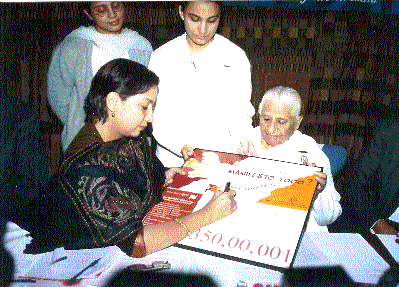Chapter 1: The Anti-Imperialist League 1898-1902
Pages 3 - 4
Chapter 2: The People's Council 1917-1919
Pages 5 - 6 - 7
Chapter 3: The American League Against War and Fascism and the Emergency Peace Campaign 1933-1939
Pages 8 - 9 - 10
Chapter 4: The Progressive Citizens of America 1946-1948
Pages 11-12
Chapter 5: The "Mobes" against the Vietnam War 1966-1970
Pages 13-14
Chapter 6: The Nuclear Freeze Movement and People-to-People Diplomacy 1980-1990
Pages 15-16-17-18
Chapter 7: Global Movement for a Culture of Peace 2000-
Pages 19-20-21
Chapter 8: The Root Causes of War
Pages 22-23-24-25-26-27
Chapter 9: The Future of the Peace Movement
Pages 28-29-30-31
Acknowledgements
Page 37
(continued from previous page)
In the name of UNESCO, Director-General Mayor sent out thousands of letters to mobilize support for the culture of peace. They went to all Heads of State, over 180 National Commissions for UNESCO in the Member States, over 70 UNESCO field offices, hundreds of international non-governmental organizations affiliated with UNESCO, and thousands of university presidents and mayors of major cities. Along with posters and flyers for the Manifesto 2000, television and radio spots, and a manual for conducting the campaign, this preparation bore fruit. In September 2000, over 50 million signatures were symbolically presented to the President of the UN General Assembly in New York, and by the end of the year, the sum had reached 75 million, more than one percent of the earth's population.

|
| Figure 10. Signing of Manifesto 2000: 35 millionth in India - 2000 |
By extending the culture of peace initiative into a UN Decade from 2001-2010, including continued signatures on the Manifesto 2000, the UN General Assembly has provided a framework for further development of the Global Movement for a Culture of Peace. However, because of objections by the rich Member States no funds have been provided for this purpose. The culture of peace resolutions were pushed forward at the UN by the countries of the South, and although the rich nations eventually signed on, they resisted along the way. In the fall of 1998, their diplomats at UNESCO in Paris refused to discuss the draft UN resolution, and immediately afterwards their diplomats in New York claimed that it could not be discussed in the UN because it had not been properly discussed in Paris. Once on the agenda, the European Union insisted that all reference to the culture of war must be removed (this was in May 1999, at the height of the bombing of Kosovo). At one point, Director-General Mayor suggested that the culture of peace should include a provision for a "human right to peace." This was so strongly attacked by the Europeans at the UNESCO General Conference in 1997 that countries of the South accused them of resisting the culture of peace in order to maintain the profits from their arms industries. And at the May 1999 informal discussions on the draft resolution, the U.S. delegate stated that his country was opposed to any reference to a human right to peace "because that would make it more difficult to start a war."
The countries of the South, the overwhelming majority of the UN General Assembly, continue to support UN resolutions and programme of action on a culture of peace. As African delegates pointed out during a meeting on the culture of peace at UNESCO: "Don't think that the culture of war comes from the South. Ask where the weapons come from. Where do the violent television programs come from? And where are the terms of trade set that impoverish our people?" Although the countries of the South support the culture of peace at the UN, their actions are limited by the lack of budget. Therefore, the leadership of the Global Movement for a Culture of Peace needs to be assumed by non-governmental organizations, using the framework provided by the UN.
 |
 |
 |